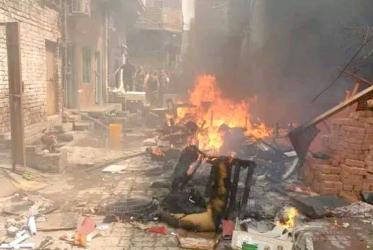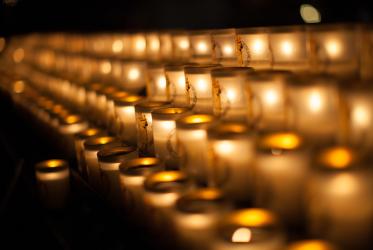Peacemakers who sow in peace reap a harvest of righteousness. (James 3:18)
The persistence and spread of extremist violence in the world, and the ambiguous connections with religion, are causes of increasing alarm and concern today. This concern has again been sharpened and exemplified in very recent days by the 19 June attack targeting His Holiness Patriarch Aphrem II Karim of the Syrian Orthodox Patriarchate of Antioch and All the East, the first time that such an attack has been directed against a head of the church in such a way. Also, the apparently motivated, at least in part, by religious sentiments, the 12 June mass shooting in Orlando, Florida, targeting people on the basis of their sexual orientation resulted in 49 deaths and 53 injured, the worst mass shooting in 21st Century US history. And, religiously motivated violence by Boko Haram affects Muslim and Christian communities throughout the West African region on a regular basis. The World Council of Churches (WCC) condemns and denounces all such violent attacks and any religious justification or support for them.
Throughout its history – following the example and in the mission of Jesus Christ, the Prince of Peace – the WCC has sought to be an instrument of peace in a world torn by violence. Founded in the aftermath of World War II, the WCC denounced warfare for the subjugation and domination of others. Shocked by the destruction unleashed by atomic weapons, it has worked consistently for disarmament and the elimination of all weapons of mass destruction. Appalled by the Holocaust and by recurrent expressions of genocidal enmity, it has condemned hatred and violence directed against people on the basis of their racial or religious identity. Committed to the value of every human life, it has promoted dialogue and the peaceful resolution of disputes rather than the resort to armed force, and ultimately seeks to delegitimize the institution of war. Recognizing the inherent God-given dignity of every human being, it has worked for protection of the human rights of every person regardless of race, ethnicity, religion, gender or sexual orientation. Considering religion a powerful resource for peace, it has engaged in and promoted inter-religious cooperation to address conflicts in multi-faith societies.
Carrying forward its commitment to peace in a new historical and political context, the WCC launched the ecumenical Decade to Overcome Violence (DOV) 2001-2010, confronting pervasive violence in its many forms and expressions. Through the DOV, the WCC and the ecumenical movement sought to address new challenges related both to the prevalence of intra-state conflicts and to the ambiguous role of religion in emerging forms of violent extremism and terrorism, as well as much older ongoing threats to peace and to the security of people, families and communities.
Convened to harvest the achievements of the DOV, the International Ecumenical Peace Convocation (IEPC) held in Kingston, Jamaica, in 2011, expressed an ecumenical commitment to "seeking the means to address violence and to reject war in favour of ‘Just Peace’". The Ecumenical Call to Just Peace articulated four dimensions of this holistic concept – peace in the community, peace with the Earth, peace in the marketplace, and peace among the peoples.
The Ecumenical Call to Just Peace acknowledged that Christians have often been complicit in systems of violence, injustice, militarism, racism, sexism, casteism, intolerance and discrimination, but that they seek forgiveness and transformation. It also appealed to governments and other groups to stop using religion as a pretext for the justification of violence.
At the 10th WCC Assembly, Busan, 2013, WCC member churches committed themselves to moving together on a ‘Pilgrimage of Justice and Peace’. The assembly adopted a statement on "The Way of Just Peace" in which this way was described as "a journey into God’s purpose for all humanity and all creation" rooted in the hope of spiritual transformation.
The 10th Assembly also adopted a statement on "The Politicization of Religion and Rights of Religious Minorities" in which concern was expressed about "growing instances of hatred, intolerance and discrimination based on religion or belief in different parts of the world where religious minorities have been forced to live in vulnerable circumstances." The statement highlighted "a rising wave of religious extremism" and a growing concomitant threat of terrorism. It spoke against "the politicization of religion and the religionization of politics" which "have become pervasive phenomena in many parts of the world".
Despite the concerns, commitments and hopes expressed in these initiatives and statements, religiously-justified violence and hatred, oppression and attacks against people and communities on the basis of their religious identity have in the meantime only increased, and have become one of the dominating motifs of our times. Emblematic of this trend is the emergence – especially since mid-2014 – of the so-called ‘Islamic State’ group and the exceptionally brutal violence it unleashed against Yazidis, Christians and Muslims in the areas under its control in Syria and Iraq.
Nevertheless, religiously-motivated violence is a feature of both the histories and current realities of all major religions – of Islam, Hinduism, Buddhism, Judaism and Christianity – and minority communities of many different religions in many parts of the world are currently increasingly targeted by hate speech and violent attacks.
Recognition of this fact must shake religious leaders and communities free from any complacency or excuse, and oblige us all to enquire into what it is about religion and/or religious identity that is so susceptible to being linked to violence, either as protagonist/perpetrator or as victim, and to interrogate our own traditions and interpretations for sources of violence against others. The easy path of seeking to distance one’s own religion from those who have perpetrated acts of violence in its name is not an adequate or legitimate response to the gravity of this challenge. Frank and self-critical introspection is an essential foundation for meaningful and effective interfaith dialogue and cooperation for the way of just peace.
The WCC central committee, meeting in Trondheim, Norway, 22-28 June 2016:
- Considers
- that, particularly in view of the increasing significance of these matters in current world affairs, religious leaders and communities from all faith traditions are called to self-examination and reflection on the relationship between religion and violence, and to challenge interpretations and practices that support violence and hate speech against others and that threaten peace and social stability.
- Calls
- on WCC member churches and ecumenical partners to give priority to reflecting on issues of religion and violence in their own contexts, taking seriously the need for openness to and appropriate support for those who may be seen as ‘other’ in each situation; to support fellow Christians who are suffering as a result of religiously-motivated violence; to extend such support not only to Christians but also to others who suffer similarly; and above all to speak words of Christian love for all into situations of violence and division.
- Decides
- to continue a special thematic focus on the issue of peace building in contexts of religion and violence during 2017 within the framework of the Pilgrimage of Justice and Peace.
- Encourages
- the exploration of the importance of education, including theological education and formation as well as formal and informal education of children, as a tool for preventing and countering radicalization, focusing on peace-affirming rather than violence-affirming strands.
- Emphasizes
- the need for churches to recognize and address the pernicious persistence of sexual and gender-based violence, from the domestic setting to the field of armed conflict, including sexual harassment and abuse by religious leaders, and especially to confront and challenge any religious interpretations or traditions that encourage or tolerate sexual and gender-based violence.
- Stresses
- the importance of engaging in work and initiatives for the healing of those who have suffered trauma, including the healing of memories, as a result of religiously-motivated violence.
- Requests
- the general secretary to strengthen partnerships and joint initiatives with ecumenical and inter-religious partners, the inter-governmental system and civil society partners aimed at preventing incitement to atrocity crimes, and to tackle more explicitly the question of the relationship between religion and the public space, including freedom of choice, freedom of religion and equal citizenship rights – constitutionally guaranteed – for all, regardless of religious affiliation.
- Calls
- upon the WCC and its member churches to encourage and engage in forms of dialogue which address the difficult questions in inter-religious relationships, including the link between religious ideologies and violence, and the undervaluing of the contribution of women in some religious traditions.
- Encourages
- members of the ecumenical movement to engage in, in addition to inter-religious dialogue, practical cooperation with organizations representing other religions on issues relating to justice, peace and the well-being of communities.
- Encourages
- the study and adoption of the principles and practices of active non-violence, as the most legitimate and appropriate means of countering discrimination and oppression and of breaking the cycle of violence.
APPROVED

